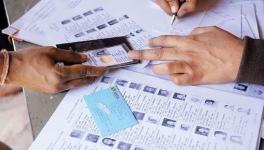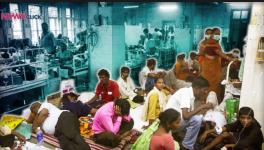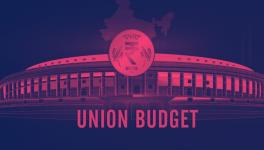Economy’s Clear Signal: Boost Demand, Not Loans
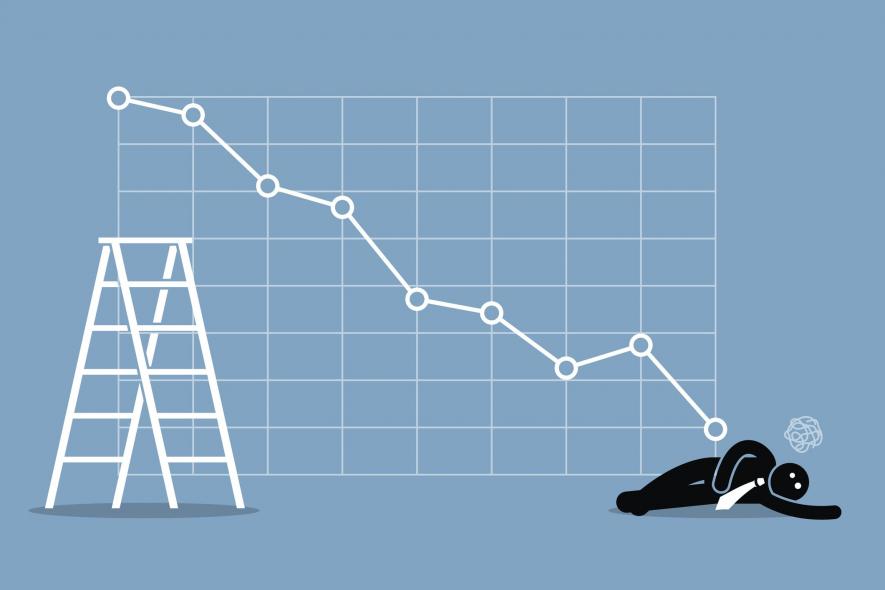
The Covid-19 pandemic is an unprecedented crisis that almost all countries are struggling to cope with. Like the rest of the world, India is fighting the spread of the disease and its adverse consequences on the health system and its finances. On the economic front, India was already facing a prolonged slowing down. Even before the pandemic touched its territories, the GDP growth rate had gradually decreased. Over the last four financial years, it dropped from 8.3% in 2016-17 to 7% and 6.1% in 2017-18 and 2018-19 respectively. The growth rate fell to 4.2% over 2019-20.
Since 25 March, India has imposed a nationwide lockdown in order to slow down the spread of the Novel Coronavirus which causes the Covid-19 disease. However, the infection only surged during the shutdown. The first Covid-19 infection was reported in January and now, in the first week of June, confirmed cases have crossed 2.39 lakhs. India has climbed to the 6th position among nations in terms of reported cases of Covid-19 infections.
Now, more than 90% of India’s workforce is in the informal sector. The nationwide lockdown stretching for over two months has snatched away the sources of income, food and even shelter from many of them, putting worker’s lives at stake. Millions of migrant workers returned to their homes in different regions of the country after the wheels of industry were jammed and other economic activities halted by the lockdown. Even as these poor and marginalised millions struggle for survival, cyclones and a locust crisis disproportionately impacted their livelihood in many states.
To put the economy on the recovery track after the damage caused by the pandemic, the Union Finance Minister started unveiling special economic packages, starting on 14 May and ending the long list of measures on 17 May. During her announcements, Nirmala Sitharaman revealed a clear vision—the government does not believe in “doles”. Those who have walked thousands of kilometres, arriving practically half-dead at their homes, are now sharing one meal among three in their native villages. Parents are trying to avoid their desperately-hungry children and crying babies, for they have nothing to give them to eat. Many of them are not even aware if the government has made food or cash provisions for them. But no, food and cash in the hands of the poor would be a “dole” as far as the managers of the economy are concerned, and “doles” are not good for the health of the economy.
Yet, the government seems to think it has a magic wand in its hand, and its remedy to boost the economy, will be offering loans, selling off public assets and resources and undertaking many more such projects. Economists would mark out these kinds of proposals of the government as supply-side interventions. The prerequisite for the effectiveness of such measures is that the demand side of the economy must be in healthy working order. But therein lies the big problem.
On 4 June, central banker Reserve Bank of India released its quarterly Consumer Confidence Survey report for which it surveyed 5,300 households living in 13 major state capitals to gauge their present perceptions and future expectations of the economy. They were quizzed on the employment scenario, their income and spending. Based on their responses, the RBI has developed two indices, the Current Situation Index (CSI) and the Future Expectation Index or FEI. On both indices, 100 is the benchmark, which means that a score of less than 100 would be considered the zone of pessimism.
As the RBI itself says, “Consumer confidence collapsed in May 2020, with the current situation index (CSI) touching historic low and the one year ahead future expectations index (FEI) also recording a sharp fall, entering the zone of pessimism.”
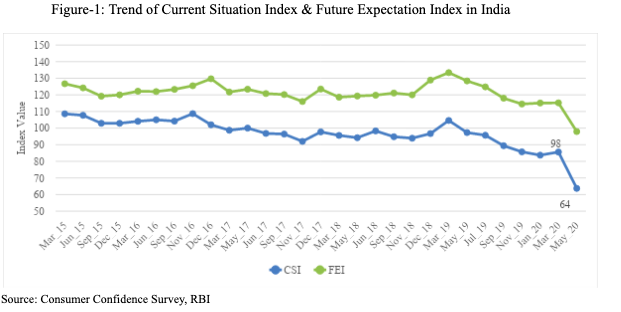
From the trend of CSI as well, it is evident that the economy was staggering since mid-2017 and reached its worst ever levels during the ongoing lockdown. Studying the various indicators separately and comparing responses with last year’s figures, we find that all the parameters have worsened (Figure 2).
Around three-fourths of the respondents have recorded that the economic situation deteriorated in May, compared to only 33% at the same time last year. Adverse employment and income situations were also reported by most of the respondents.
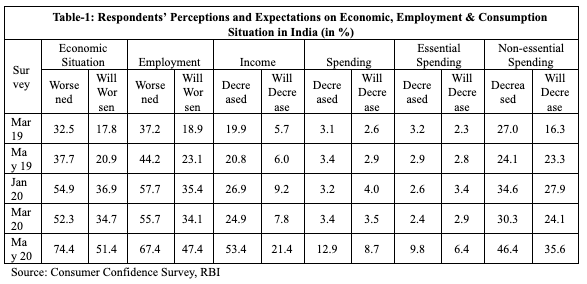
The decreased level of income naturally impacted the spending capacity of people and accordingly the highest-ever proportion of respondents have reported a fall in their spending. A substantial proportion of consumers are cutting non-essential spending and do not expect the situation to change until next year. The most unfortunate fact is that households are also cutting spending on essential items and the share of those doing so was the highest ever in May 2020.
If this is the situation in state capitals, the conditions in small towns and villages can easily be estimated.
There is a substantial problem on the demand side of the economy and people do not have enough purchasing power. If there is lack of demand in the economy, then it is unwise to raise production. Given this situation, the government should make some demand-side interventions to revive the economy. Many eminent economists such as Amartya Sen, Abhijit Banerjee, Kaushik Basu and Raghuram Rajan have suggested that the poor be given immediate assistance at the earliest, even in the form of cash. This is not just to help the poor, but to refuel the economy and raise demand.
The basic argument is that if demand increases then production would also rise and that would generate more employment eventually. On the other hand, if the government plans for a deficit-free budget and restricts spending, then both production and income would be lower and tax revenues would also fall. Consequently, it would not be possible to achieve the deficit target. But then our government does not believe in “doling out” any benefits.
Keynes’ prescriptions to pull the economy out of the Great Depression have taught us that if government spends money on the poor that does not amount to “waste”. It is this that would help the poor survive the lockdown and its aftermath and it is this that will get the wheels of the economy unstuck again.
Montu Bose teaches at the TERI School of Advanced Studies, New Delhi and Sibin K Tiwari is a postgraduate student at the same institute. The views are personal.
Get the latest reports & analysis with people's perspective on Protests, movements & deep analytical videos, discussions of the current affairs in your Telegram app. Subscribe to NewsClick's Telegram channel & get Real-Time updates on stories, as they get published on our website.









